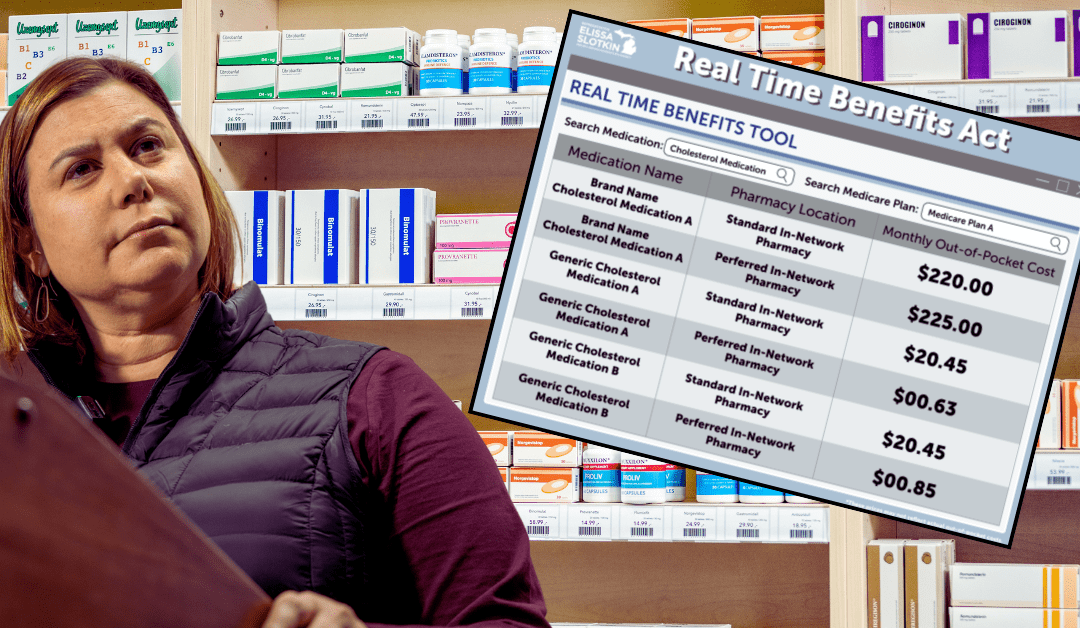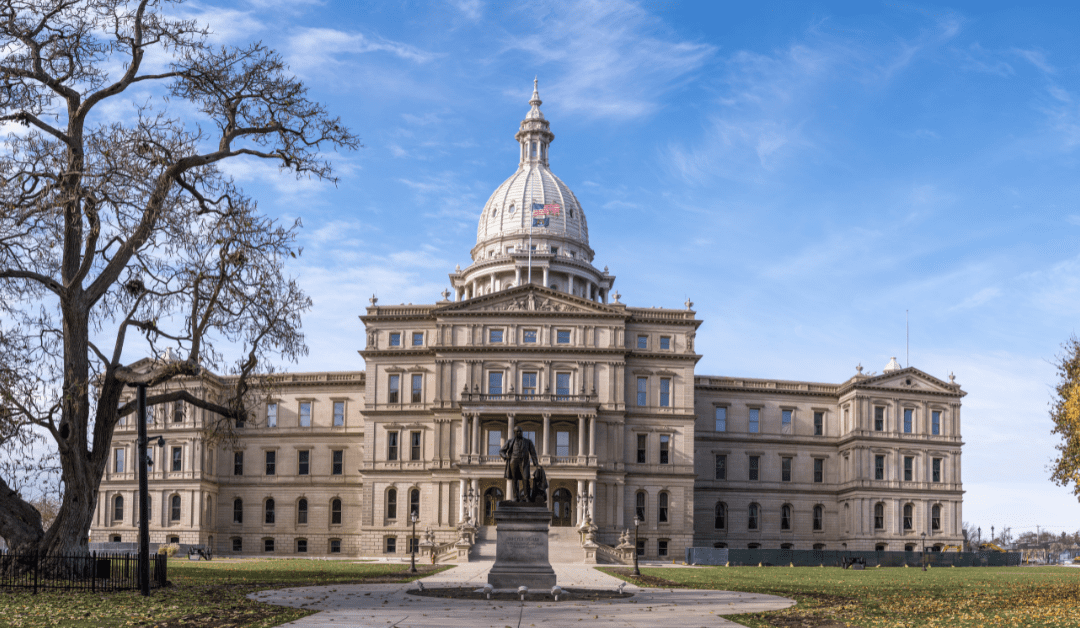
Photo Illustration/Kevin Dietsch/Getty Images
President Joe Biden signed the American Rescue Plan Act in 2021. Three years later, the federal legislation is still paying dividends for Michiganders—and their bank accounts.
MICHIGAN—When President Joe Biden signed the American Rescue Plan Act (ARPA) into law in 2021, Michigan was in the throes of a COVID-19-induced economic crisis—with more than 1 million Michiganders having at least temporarily lost their jobs in the wake of the pandemic.
Small businesses struggled to stay afloat. Hundreds sank. Cities and townships grappled with ways to maintain basic public services as tax revenue declined. Some reportedly put off projects like road construction or suspended programs like parks and recreation; others slashed pay for their employees, instituted layoffs, and were forced to dip into funds saved for rainy days.
But three years later, aided by funding from the American Rescue Plan, Michigan’s economy and its workers have gone on to make a full recovery—with at least 11,100 more employed Michiganders now living in the state now compared to February 2020, before the pandemic.
Billions of dollars in relief have been distributed to small businesses across the state. Federal funding provided to the state government—and every city, village, and township in Michigan—has also helped local governments regain their footing, shore up their pension funds, and make record-setting investments in public safety, education, healthcare, and much more.
And new federal data released this week shows that the American Rescue Plan supported both pandemic recovery needs and long-term economic growth, as well as laid the foundation for other federal investments like the Inflation Reduction Act and Bipartisan Infrastructure Law.
In a statement, US Treasury Secretary Janet Yellen said that “decisive action” from the Biden administration has led to a “historically fast and inclusive” economic recovery across the country.
“Communities nationwide continue to use resources unlocked by President Biden’s legislation to support American workers and families,” she said. “ARPA also laid the foundation for our long-term economic agenda, which will fuel growth and expand opportunity for years to come.”
Here are 10 ways in which the American Rescue Plan Act is making a difference in Michigan:
Jobs, Jobs, Jobs
The Biden administration credits funding from the ARPA for helping to drive record-setting job growth nationwide over the last three years—marked largely by the creation of roughly 15 million new jobs nationwide (including more than 300,000 in Michigan) since Biden took office.
The national unemployment rate, which topped 6.4% when Biden became president, has been below 4% for the last 25 months—the strongest such run in more than 50 years. In Michigan, the unemployment rate dropped from 6.5% in 2021 and has kept at 4% for the last 14 months.
And with intentional investments in economically disadvantaged communities, people of color have benefited as well. In 2021, the nation’s Black and Hispanic unemployment rates tracked their largest one-year drop since the early 1980s, and hit new all-time lows in 2022 and 2023.
Nationwide, women’s unemployment is also at its lowest annual average rate since 1953.
Small Business Support
The American Rescue Plan Act included reforms to the federal Paycheck Protection Program, designed to ensure billions of dollars in relief was equitably distributed to small businesses. More than 3,200 Michigan restaurants also received direct funding through the ARPA.
Additional federal programs funded through the legislation also provided financial assistance to venues—like stadiums and theaters—that were forced to shut down during the pandemic, as well as to nonprofit organizations that were struggling to maintain their usual fundraising efforts.
The White House touts ARPA as part of the reason that a record-breaking 16 million new business applications have been filed nationwide over the last 3 years—about 55% more than what was tracked before the pandemic.
And in Michigan, the surge in new businesses still hasn’t stopped. According to US Chamber of Commerce data, nearly 150,000 small business applications were filed in the state in 2023.
Child Care
Funding provided through the American Rescue Plan Act provided more than $700 million to help nearly 6,500 child care programs stay open during the pandemic. This helped ensure that about 300,000 children had access to reliable care. Federal data shows that most of those funds were used to cover rent and mortgage payments.
All told, nearly 80% of Michigan child care centers received funding. The Biden administration also credits the ARPA for lowering annual child care costs by $1,250 per kid, bringing thousands more women into the workforce, and boosting wages for child care workers by 10%.
Education
The ARPA also included nearly $170 billion for public schools nationwide—which the National Education Association has billed as the “single largest-ever investment in education.”
All told, more than 15,000 school districts received funding through the legislation to help safely reopen during the pandemic, as well as to help their students catch up on learning losses, launch new summer and afterschool programs, and boost pay for teachers and other staff.
Data shows that school districts have been using the funds to focus on academic recovery—with more than 80% already committed to be spent on investments like staffing, tutoring, afterschool and summer programs, new classroom materials, and building upgrades.
Michigan high schools have also used the funds to create new spaces for students to learn—like a new “Immersion Technology Room” at Mason County Central School District—and to hire more counselors and academic coaches, including at 32 schools in Wayne County.
The ARPA also created the first-ever summer nutrition benefit with nationwide reach—helping children who rely on free and reduced-price meals afford food over the summer months. Federal officials said the program has since reached the families of more than 30 million students.
More than 18 million college students have also received direct financial assistance through the American Rescue Plan Act, including an estimated 6 million community college students.
Fighting Poverty
The Biden administration credits the American Rescue Plan for leading to the lowest child poverty rate in history—namely through the temporary expansion of the federal Child Tax Credit.
In Michigan, families of nearly 1.9 million children benefited from that tax relief in 2021—with more than 1.1 million families receiving $3,000 or $3,600 per child, depending on their age. The legislation also enabled Michigan families earning less than $125,000 to get back up to half of what they spent on child care while working or studying, saving up to $8,000 for two children.
An expansion to the federal Earned Income Tax Credit also benefited 600,000 workers in Michigan in 2021, providing up to $1,500 in tax relief to those without dependent children.
The American Rescue Plan Act also funded those $1,400 stimulus checks that were sent to every taxpaying Michigander to help offset the financial impact of the COVID-19 pandemic.
Local cities and towns across the state have also deployed ARPA funding to help lift Michiganders out of debt—including a new program announced last year in Wayne County that aims to pay off up to $700 million in outstanding medical debt for up to 300,000 local residents.
Oakland County also announced a similar, federally funded program earlier this year.
Housing
Emergency rental assistance funding from the ARPA helped more than 8 million renters nationwide stay in their homes during the pandemic, according to White House data. Michigan received more than $1.1 billion in federal funding to be used for rental and utility assistance.
State officials said more than 250,000 applications were received, with more than 130,000 approved—an average of about $5,600 in aid for each household. Additional funding was designed to help low- and middle-income homeowners who fell behind on their bills.
The city of Jackson also used $2.5 million in ARPA funding to support its aptly named 100 Homes Program—which aims to construct 100 new houses on vacant, city-owned lots, which will then be sold to low-income residents at a discounted price. In Flint, about $50,000 in ARPA funding was dedicated to providing legal assistance to low-income residents facing foreclosure.
Another ARPA-funded program that was announced last year in the city of Detroit is providing hundreds of Detroiters with up to $25,000 in down-payment assistance to buy a new home.
Healthcare
The American Rescue Plan Act also expanded health care coverage through the Affordable Care Act (ACA)—ensuring more middle-income families in Michigan were eligible for low- or no-cost insurance, and providing key incentives for states to expand Medicaid.
The law’s subsidies—which were reauthorized as part of the Inflation Reduction Act in 2022—led to record-breaking sign-ups for ACA plans this year. More than 21 million Americans (including 418,000 Michiganders) enrolled in plans for 2024.
Last year, the US Department of Agriculture also unleashed nearly $130 million in federal ARPA funding to nearly 200 rural health care organizations across the country. In Michigan, 11 health care organizations were selected to receive about $4.5 million in funding to help expand care.
The legislation also included reforms to Medicaid that prompted the nation’s three major insulin makers in January to drop their prices for the drug and cap out-of-pocket costs at $35 per month for some of their most popular insulin products.
Workforce Development
Tens of billions of dollars from the American Rescue Plan Act have gone to support workforce training efforts nationwide—including $12.8 billion in state and local funds invested in over 4,300 programs (like apprenticeships) to prepare workers for new, high-wage jobs, officials said.
In Michigan, more than $14 million in federal ARPA funds were awarded this year to nonprofit groups that can help remove barriers to employment—namely by helping workers with transportation and child care. Gov. Gretchen Whitmer’s administration also set aside more than $2 million in ARPA funding to help expand apprenticeship opportunities for childcare workers.
Public Safety
The Biden administration credits the American Rescue Plan Act for fueling the “largest-ever” federal investment in preventing crime, reducing violence, and investing in public safety.
More than $15 billion in ARPA funds have been dedicated to public safety, with investments by over 1,000 state and local governments to avoid cuts to police budgets, hire more cops, upgrade equipment for first responders, and expand community violence intervention programs.
One example: Funding from the legislation helped pay for bonuses and to hire 200 additional police officers in Detroit, which Police Chief James White said helped lead to a significant reduction in violent crime. That includes a 16% reduction in nonfatal shootings, a 34% decrease in carjackings, and an 18% decrease in homicides in 2023—the lowest rate tracked since 1966.
Pension Protection
In 2022, the Biden administration announced that $36 billion in ARPA funding will help prevent substantial cuts to the pensions of more than 350,000 union workers and retirees.
All told, investments provided through the American Rescue Plan have helped more than 200 large retirement plans stay solvent and able to pay full benefits through at least 2051, according to the White House. Federal officials also said up to 3 million people benefited from the assistance, marking the “most significant investment in pension security” in five decades.
READ MORE: How is the Inflation Reduction Act helping Michiganders?
For the latest Michigan news, follow The ‘Gander on Twitter.
Follow Political Correspondent Kyle Kaminski here.
Politics

Dozens march to Flint city hall as the water crisis turns 10 years old
BY KEN COLEMAN, MICHIGAN ADVANCE MICHIGAN—Chanting “Clean water is what we demand,” “Water is a right” and “No justice, no peace,” dozens of people...

Slotkin urges Michiganders to compare prices before buying prescription drugs
A law sponsored by Congresswoman Elissa Slotkin is helping patients compare prices for different prescription drugs at different pharmacies—saving...

‘Melody’s Law’ would explicitly criminalize necrophilia in Michigan
BY ANNA LIZ NICHOLS, MICHIGAN ADVANCE MICHIGAN—There is no law on the books in Michigan that expressly criminalizes engaging in sexual conduct with...
Local News

4 Michigan dispensaries that will deliver weed straight to your doorstep
MICHIGAN—If you’ve ever dreamed of purchasing quality weed without ever having to leave your house, then you’re in luck. Michigan dispensaries have...

The 9 best pizzas in Michigan, according to our research
When it comes to finding the best pizza in Michigan, the options are endless. From the bustling city of Detroit to the quaint town of Cadillac,...






